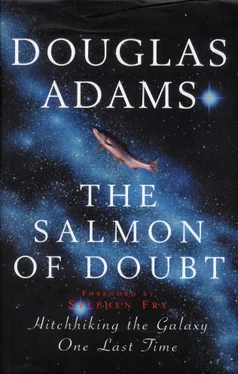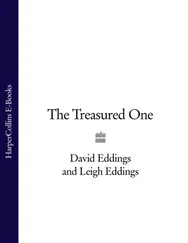O. That logic seems kind of flawed.
D.A. So what happens, of course, is that Men in Black came out this past year, so suddenly somebody has done it already. And Men in Black is ... How can I put this delicately? There were elements of it I found quite familiar, shall we say? And suddenly a comedy science-fiction movie that was very much in the same vein as Hitchhiker’s became one of the most successful movies ever made. So that kind of changed the landscape a little bit. Suddenly people kind of wanted it. The project with Michael ... In the end, we hadn’t gotten it take, so we parted company very good friends, and still are, I just hope that there will be other projects in the future that he and I will work on together, because I like him enormously and we got on very well together. And also, the more time I get to spend in Santa Fe, the better. So now the picture’s with Disney—or, more specifically, with Caravan, which is one of the major independent production companies, but it’s kind of joined at the hip to Disney. It’s been very frustrating not to have made it in the last fifteen years; nevertheless, I feel extremely buoyed by the fact that one can make a much, much, much better movie out of it now than one could have fifteen years ago. That’s in technical terms; in terms of how it will look and how it will work. Obviously the real quality of the picture is in the writing and the acting and the directing and so on and so forth, and those skills have neither risen nor sunk in fifteen years. But at least one substantial area, in how it can be made to look, has improved a great deal.
O. And Jay Roach [Austin Powers] is directing it, right? D.A. That’s right. He’s a very interesting fellow.
I’ve now spent quite a lot of time talking to him. The key to the whole thing, in many ways, was when I met Jay Roach, because I hit it off very well with him, and thought, “Here’s a very bright, intelligent guy.”
Not only is he a bright, intelligent guy, but here’s a measure of how bright and intelligent he is: he wants me to work very closely on his movie. Which is always something that endears a writer to a director. In fact, when I was making the original radio series, it was unheard of to do what I did. Because I’d just written it. But I kind of inserted myself in the whole production process. The producer/director was a little surprised by this, but in the end took it in very good grace. So I had a huge amount to do with the way the program developed, and that’s exactly what Jay wants me to do on this movie. So I felt, “Great, here’s somebody I can do business with.” Obviously I’m saying that at the beginning of a process that’s going to take two years. So who knows what’s going to happen? All I can say is that at this point in the game, things are set as fair as they possibly could be. So I feel very optimistic and excited about that.
fact, when I was making the original radio series, it was unheard of to do what I did. Because I’d just written it. But I kind of inserted myself in the whole production process. The producer/director was a little surprised by this, but in the end took it in very good grace. So I had a huge amount to do with the way the program developed, and that’s exactly what Jay wants me to do on this movie. So I felt, “Great, here’s somebody I can do business with.” Obviously I’m saying that at the beginning of a process that’s going to take two years. So who knows what’s going to happen? All I can say is that at this point in the game, things are set as fair as they possibly could be. So I feel very optimistic and excited about that.
It’s been nearly twenty years since the radio program, right?
D.A. Well, it’s almost exactly twenty years. It’ll be twenty years next month.
O. What’s the enduring appeal of Hitchhiker’s Guide to the Galaxy? D.A. Well, I don’t know. All I know is that I worked very hard at it, and I worried very much about it, and I think I made things very difficult for myself doing it. And if ever there was an easy way of doing something, I would find a much harder way to do it. And I suspect that the amount that people have liked it is not unrelated to the amount of work I put into it. That’s a simplistic thing to say, but it’s the best I can come up with.
O. Is the idea that the movie will cover the first book?
D.A. Yeah. It’s funny, because I’ve been looking around the Web at what people have been saying.
I’ve seen, “He’s going to put all five books into it.” People just don’t understand the way a book maps onto a movie. Somebody said, and I think quite accurately, that the best source material for a movie is a short story. Which effectively means, yes, it’s going to be the first book. Having said that, whenever I sit down and do another version of Hitchhiker, it highly contradicts whichever version went before. The best thing I can say about the movie is that it will be specifically contradicting the first book. O. Which version of Hitchhiker are you happiest with?
D.A. Not the TV version, that’s for sure. In different moods I will feel either the radio or the book, which are the two other versions left, so it’s got to be one of those, hasn’t it? I feel differently about each of them. On the one hand, the radio series was where it originated; that’s where it grew; that’s where the seed grew. Also, that’s where I felt that myself and the other people working on it—the producer and the sound engineers and so on, and, of course, the actors—all created something that really felt groundbreaking at the time. Or rather, it felt like we were completely mad at the time. I can remember sitting in the subterranean studio, auditioning the sound of a whale hitting the ground at three hundred miles an hour for hours on end, just trying to find ways of tweaking the sound. After hours of that, day after day, you do begin to doubt your sanity. Of course, you have no idea if anybody’s going to listen to this stuff. But, you know, there was a real sense that nobody had done this before. And that was great; there’s a great charge that comes with that. On the other hand, the appeal of the books to me is that that it’s just me. The great appeal of a book to any writer is that it is just them. That’s it. There’s nobody else involved. That’s not quite true, of course, because the thing developed out of a radio series in the first place, and there is a sense in there of all the people who have contributed, in one way or another, to the radio show that it grew out of. But, nevertheless, there is a this-is-all-my-own-work feel about a book.
And I’m pleased with the way it reads. I feel it flows nicely. It feels as if it were easy to write, and I know how difficult that was to achieve. O. Do you ever get tired of Hitchhiker’s Guide to the Galaxy? D.A.
There was a period where I got heartily sick of it, and I really never wanted to hear anything more about it again, and I would almost scream at anybody who used the words to me. But since then, I went off and did other things. I did the Dirk Gently books. My favorite thing that I’ve ever done was a thing I did about ten years ago: I went around the world with a zoologist friend of mine, and looked for various rare and endangered species of animals, and wrote a book about that called Last Chance to See, which is my own personal favorite Hitchhiker now is something from the past that I feel very fond of; it was great, it was terrific, and it’s being very good to me. I had a conversation a little while ago with Pete Townshend of The Who, and I think at that point I was saying, “Oh God, hope I’m not just remembered as the person who wrote Hitchhiker’s Guide to the Galaxy.” And he kind of reprimanded me a little bit. He said, “Look, I have the same thing with Tommy, and for a while I thought like that. The thing is, when you’ve got something like that in your history, it opens an awful lot of doors. It allows you to do a lot of other things. People remember that. It’s something one should be grateful for.” And I thought that was quite right.
Читать дальше










